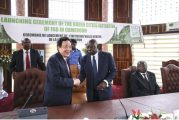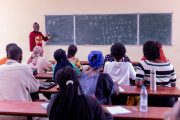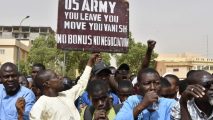Categories
Recent Posts
- Understanding the Biya Francophone regime’s support for the Israeli genocide in Gaza
- US: Prosecution lays out ‘criminal conspiracy’ as Trump’s hush money trial opens
- FAO formally launches Green Cities Initiative in Cameroon
- Football: Barcelona wants Clasico replay if Yamal ‘ghost goal’ call wrong
- Poverty under Biya: Cameroonians embrace Chinese language for brighter futures
Archives
- April 2024
- March 2024
- February 2024
- January 2024
- December 2023
- November 2023
- October 2023
- September 2023
- August 2023
- July 2023
- June 2023
- May 2023
- April 2023
- March 2023
- February 2023
- January 2023
- December 2022
- November 2022
- October 2022
- September 2022
- August 2022
- July 2022
- June 2022
- May 2022
- April 2022
- March 2022
- February 2022
- January 2022
- December 2021
- November 2021
- October 2021
- September 2021
- August 2021
- July 2021
- June 2021
- May 2021
- April 2021
- March 2021
- February 2021
- January 2021
- December 2020
- November 2020
- October 2020
- September 2020
- August 2020
- July 2020
- June 2020
- May 2020
- April 2020
- March 2020
- February 2020
- January 2020
- December 2019
- November 2019
- October 2019
- September 2019
- August 2019
- July 2019
- June 2019
- May 2019
- April 2019
- March 2019
- February 2019
- January 2019
- December 2018
- November 2018
- October 2018
- September 2018
- August 2018
- July 2018
- June 2018
- May 2018
- April 2018
- March 2018
- February 2018
- January 2018
- December 2017
- November 2017
- October 2017
- September 2017
- August 2017
- July 2017
- June 2017
- May 2017
- April 2017
- March 2017
- February 2017
- January 2017
- December 2016
- November 2016
- October 2016
- September 2016
- August 2016
- July 2016
- June 2016
Featured
 Understanding the Biya Francophone regime’s support for the Israeli genocide in Gaza
Understanding the Biya Francophone regime’s support for the Israeli genocide in Gaza  Poverty under Biya: Cameroonians embrace Chinese language for brighter futures
Poverty under Biya: Cameroonians embrace Chinese language for brighter futures  Cameroon is broken: Who can fix it?
Cameroon is broken: Who can fix it?  Ethiopia: U.S Senator Cardin Statement on the Killing of Bate Urgessa
Ethiopia: U.S Senator Cardin Statement on the Killing of Bate Urgessa  Battle for the Unity Palace: ANNOUNCEMENT!
Battle for the Unity Palace: ANNOUNCEMENT!
Most Commented Posts
 4 Anglophone detainees killed in Yaounde
4 Anglophone detainees killed in Yaounde
19 comments Chantal Biya says she will return to Cameroon if General Ivo Yenwo, Martin Belinga Eboutou and Ferdinand Ngoh Ngoh are sacked
Chantal Biya says she will return to Cameroon if General Ivo Yenwo, Martin Belinga Eboutou and Ferdinand Ngoh Ngoh are sacked
13 comments Anglophone Nationalism: Barrister Eyambe says “hidden plans are at work”
Anglophone Nationalism: Barrister Eyambe says “hidden plans are at work”
12 comments The Anglophone Problem – When Facts don’t Lie
The Anglophone Problem – When Facts don’t Lie
12 comments Largest wave of arrest by BIR in Bamenda
Largest wave of arrest by BIR in Bamenda
10 comments
Latest Tweets
Featured
-

Understanding the Biya Francophone regime’s support for the Israeli genocide in Gaza
-

US: Prosecution lays out ‘criminal conspiracy’ as Trump’s hush money trial opens
-

FAO formally launches Green Cities Initiative in Cameroon
-

Football: Barcelona wants Clasico replay if Yamal ‘ghost goal’ call wrong
-

Poverty under Biya: Cameroonians embrace Chinese language for brighter futures
-

US agrees to withdraw troops from key drone base in Niger
-

CPDM Crime Syndicate repays CFA39.8bn debt with new borrowings
© Cameroon Concord News 2024
3, May 2019
The Ambazonia-French Cameroun crisis: April 2019 update 0
Relations between the largely Anglophone regions of Cameroon and the country’s dominant Francophone elite have long been fraught. Over the past three years, tensions have escalated seriously and since October 2017 violent conflict has erupted between armed separatist groups and the security forces, with both sides being accused of committing human rights abuses.
The tensions originate in a complex and contested decolonisation process in the late-1950s and early-1960s, in which Britain, as one of the colonial powers, was heavily involved. Federal arrangements were scrapped in 1972 by a Francophone-dominated central government.
Many English-speaking Cameroonians have long complained that they are politically, economically and linguistically marginalised. Some have called for full independence for the Anglophone regions.
The trigger for the current crisis was the appointment of French-educated judges to courts in the English-speaking regions. Local lawyers demanded their removal and the restoration of a federal system of government.
By the end of 2016, local teachers and lawyers had launched a campaign of strikes and demonstrations. University students and other activists began to get involved too. The security forces responded heavy-handedly. The Internet and all educational institutions were closed down.
Tensions remained high during the first half of 2017. Then, on 1 October 2017, the anniversary of Anglophone Cameroon’s independence from the UK, Anglophone separatists unilaterally declared independence. Mass demonstrations were met with force. Amnesty International estimated that at least 17 people were killed in the clashes.
Since then, numerous armed separatist groups have emerged and begun a violent campaign for independence. The security forces have responded in kind. Both sides stand accused of committing serious human rights abuses. Ordinary civilians are often caught in the middle – at least 500 have reportedly died. More than 400,000 people have been displaced, with over 30,000 crossing into Nigeria. There have also been reports of clashes between rival armed separatist groups.
Seriously flawed presidential elections took place in Cameroon in October 2018. 85 year-old president Paul Biya, who has been in office since 1982, sought re-election and won again. The runner-up, Maurice Kamto, leader of the Cameroon Renaissance Movement (MRC), who had expressed sympathy for some Anglophone grievances, disputed the result and claimed victory. He called for peaceful protests.
Despite a heavy security clampdown, there was a mass boycott of the vote in the Anglophone regions. This was the main reason why Joshua Osih, the candidate of the party which traditionally has garnered most support in the Anglophone regions, the Social Democratic Front, finished fourth.
There has so far been no improvement in the situation during 2019. If anything, levels of violence have increased. In a report issued on 28 March, Human Rights Watch said that since October “at least 170 civilians have been killed in over 220 incidents in the North-West and South-West regions.”
Protests called by the MRC took place in several cities in January 2019. Then on 28 January, Kamto and other leaders of the MRC were arrested , leading to more protests. In mid-February he and 130 of his supporters were charged by a military court with rebellion, insurrection and “hostility to the Fatherland”. In April, the authorities banned some planned MRC demonstrations.
So, what are the prospects? The outlook looks bleak. Although international engagement on the Anglophone Cameroon crisis has gradually increased, there are no signs currently that this will produce a change of stance on the part of either the Cameroon government or the armed separatists. Mediation efforts by the Catholic Church have so far led nowhere.
It is impossible to say how many people in the two Anglophone regions support secession. Some might still be satisfied by a return to meaningful federalism. But there is no indication that the central government is willing to consider restoring anything approaching federalism. Cosmetic measures remain the order of the day.
Official intransigence appears to be strengthening the hands of the secessionists. There are serious tensions between some of the different armed separatist groups involved on the ground, which further complicates the prospects for a peaceful settlement further down the line.
Source: Researchbriefings